1882_beam_scale
The preferred construction of the apparatus is illustrated in the drawingaccoinpanying this 20 specification, which shows my improved balance complete, exceptingas to theboxing, which is removed to exhibit thestructure more clearly.
|
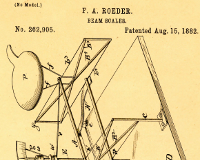 |
1885_torsional_pivot_balance
In ordinary fulcrum-balances it is essential that the center of gravity be below the center of oscillation of the beam, in order that the beam, when deflected from its normal position of rest, shall return thereto…
|
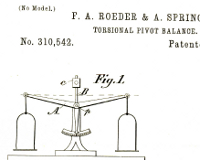 |
1965 – 2
Desk Top Manual Card Reader
|
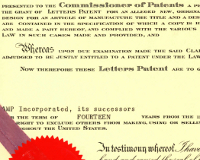 |
1965 – 1
Flush Mounted Manual Card Reader
|
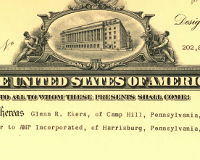 |
Laboratory scale 1952
Be it known that I, Carl L. Otto, a citizen of the United States of America, residing in the Borough of Manhattan, city, county, and State of New York, have invented a new, original, and ornamental Design for a Laboratory Scale, of which the following is a specification…
|
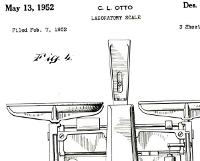 |
Dash-pot 1952
Dash-pots using air or hydraulic fluid have long been used in scales and balances, the hydraulically operated dash-pots being the more efficient. Accordingly, it is preferable to use dash-pots containing hydraulic fluid to those employing air in balances where it is desired to obtain rapid damping of the oscillations of the beam…
|
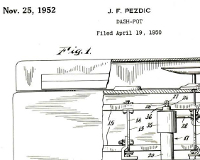 |
Torsion balance having mechanically amplified indicator 1963
In order to provide a checkweighing torsion balance which will indicate accurately over, under, or balance at a predetermined weight by a mechanical amplifying system of the pointer type, various adjustments and correcting devices are desirable…
|
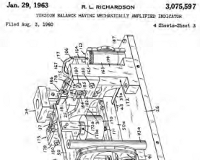 |
Torsion balance 1963
The balance embodies other elements adapted for adjustments or better operation of the balance. A threaded rod extends outwardly from the left of the beam upon which is a threaded nut. This nut may be moved toward or away from the center truss to decrease or increase the torque tending to rotate the truss about the center bands. This may be used for balancing adjustment to zero on the index scale…
|
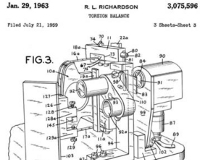 |
Balance case 1954
Balances have always been susceptible to vibration. To reduce such susceptibility to vibration in prior balances, special glass and sponge rubber devices were relied upon to support the balance…
|
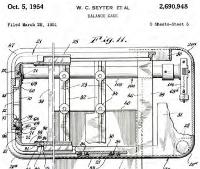 |
Torsion balance 1961
To weigh the mass, which may be assumed to be unknown, known weights are placed in the opposite or known weight pan until the two pans arc balanced, and then the weight of the unknown mass is determined by the amount of known weight necessary to balance the beams on the fulcrum of the skeleton…
|
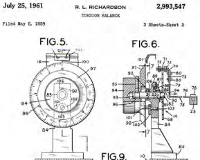 |
Switch closure mechanism 1967
Electrical switches which include a type of contact closure wherein non-resilient contact surfaces are driven against resilient contact surfaces, the displacement-fores characteristics to effect complete closure generally begin with a low value and then increase rather sharply and continuously to the end of the closure cycle…
|
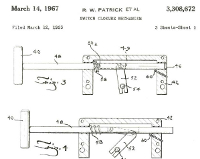 |
Mechanism for electrical switches 1967
An electric switch is disclosed having multiple spring contact members held in arrays by insulating blocks supported by a metallic frame having a central opening containing a movable plate having conductive pads on each side thereof.
|
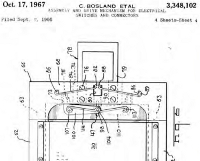 |
Card reader improvement 1969
A data card reader is disclosed featuring an array of contact springs having the ends thereof disposed in a plane.
|
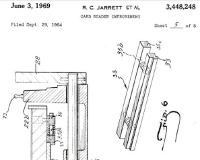 |
Gate control means for traveling platen roller 1969
A device is disclosed for reading and/or imprinting records with a plurality of modes of operation effected by an electro-mechanical control mechanism which displaces a crook shaped gate to block or pass a motor driven roller.
|
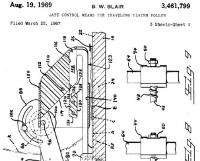 |
All-weather card reader 1969
A card reader comprises a card-reading area provided with a movable contact means and a stationary contact means for receiving a card to be read therebetween. Operating means is provided for moving the movable contact means from a nonread position to a read position when the card is properly positioned within the cardreading area.
|
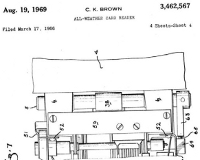 |
Locking system for a card reader 1970
Locking means is operatively engaged with the operating means to maintain the operating means in a locked position until a card to be read has been placed within the card-reading area and in engagement with the locking means whereupon the locking means is disengaged from the operating means so that the operating means can operate the movable contact means to read the information on the card to be read.
|
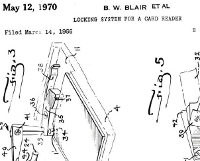 |
Punched data card reader 1970
A punched card reader is disclosed for use with cards of a type having rows and columns of punched holes defining information. The reader features an array of conductive pins arranged in rows and columns corresponding to possible punched hole locations on a card with a planar contact element spaced from the ends of said pins and means to fit a card between said contact element and the pins.
|
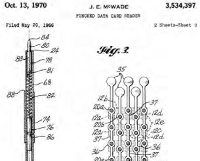 |
Credit card reader 1970
Credit cards or small cards having coded information thereon are being used in an ever increasing number in today’s business or other areas. A few of the fields in which these cards are utilizable are: accounting, identification, account identification, credit capability, process control, etc.
|
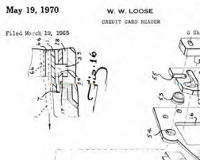 |
Electro-mechanical memory apparatus 1970
The present invention relates to a small sized memory apparatus capable of semiautomaticaliy or automatically providing a parallel and static output of a relatively large number of data bits stored in punched cards.
|
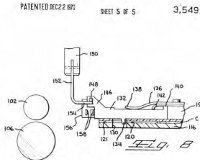 |
Card readers 1970
This invention relates to card readers for reading information contained in the form of perforations on a card.
|
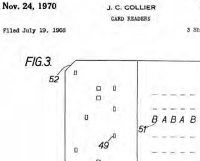 |
Card reader contact assembly 1970
This invention relates to data reading apparatus such as card readers and to multiple contact assemblies in or for such data reading apparatus.
|
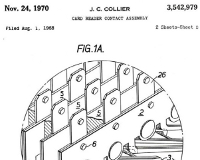 |
Card reader 1970
The disclosure relates to a card reader for reading punched cards and which includes a plurality of card stabilizers positioned along columns of contact spring members and slightly below the lower edges of the contact springs to provide a smoothing effect for mutilated punched cards to be read and thereby substantially flattening same for accurate reading by the card reader.
|
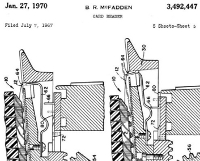 |
Card reader 1 – 1971
The foregoing and other objects are achieved preferred embodiment of a card reader imprinter comprising a card-receiving area to receive a card to be read, contact means in the card-receiving area to read coded information on the card, a card-receiving section to receive a card on which information on the card to be read can be imprinted with the…
|
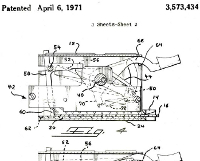 |
Card reader 2 – 1971
With big card readers which include a large number of sensors each carried on a separate spring-loaded arm, the cumulative effects of the springs requires a large pressure to be exerted on the sensor members when reading a card in order to overcome the effect of the springs and to establish good contact between the sets of contacts.
|
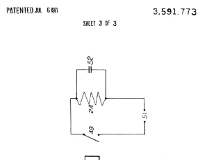 |
Card reader 3 – 1971
This new card reader also includes a simplified frame which reduces the weight and size of the reader and the same time gives improved precision. The matrix in which the sensing springs are held is rigidly mounted on the frame with great accuracy of alignment.
|
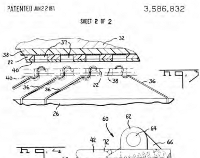 |
Card reader imprinter – 1971
A card reader imprinter comprises reading means for electrically reading coded information on a data card, printing means for printing printable information on the data card onto a card to receive the printable information, and carrying means carrying the printing means and for operating the reading means.
|
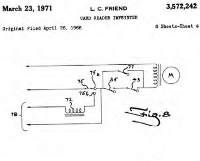 |
Sliding switch programmer – 1971
Such an electrical switch arrangement can be used as a variable data input device in a credit card system used in a shop. Such an arrangement is provided in combination with a credit card reader in a data collection unit at each sales point in the 10 shop, the data collection units being linked by wires to a central processing station.
|
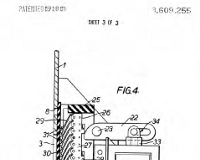 |
Card reader and transporter apparatus – 1971
A card for use in such apparatus carries information in the form of a pattern of punched holes or embossments and may 5 be made of any suitable lamina material such as paper or plastics.
|
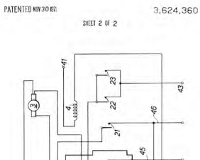 |